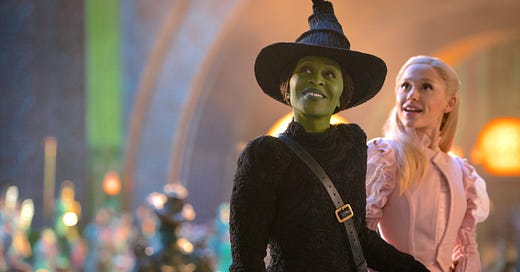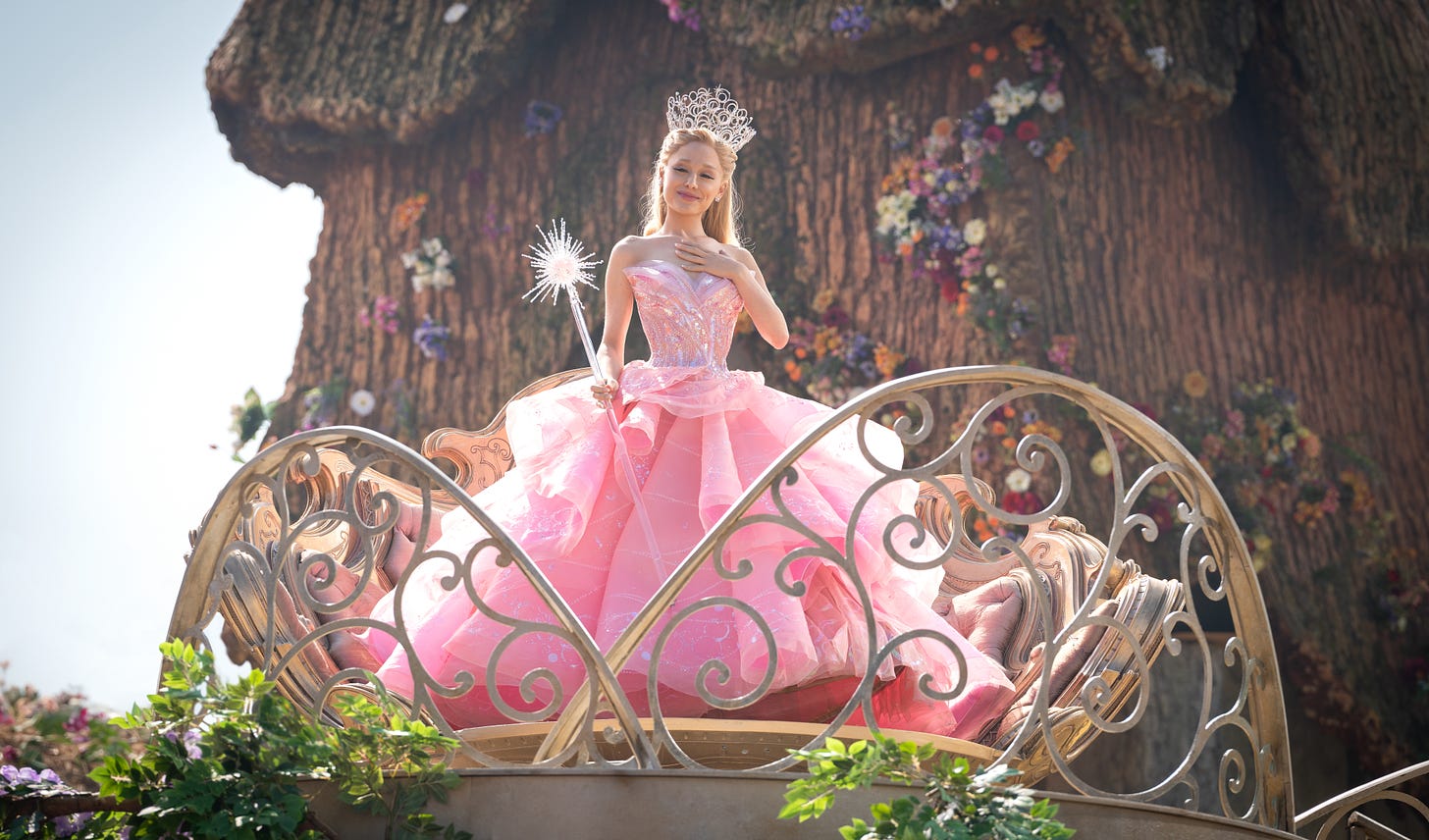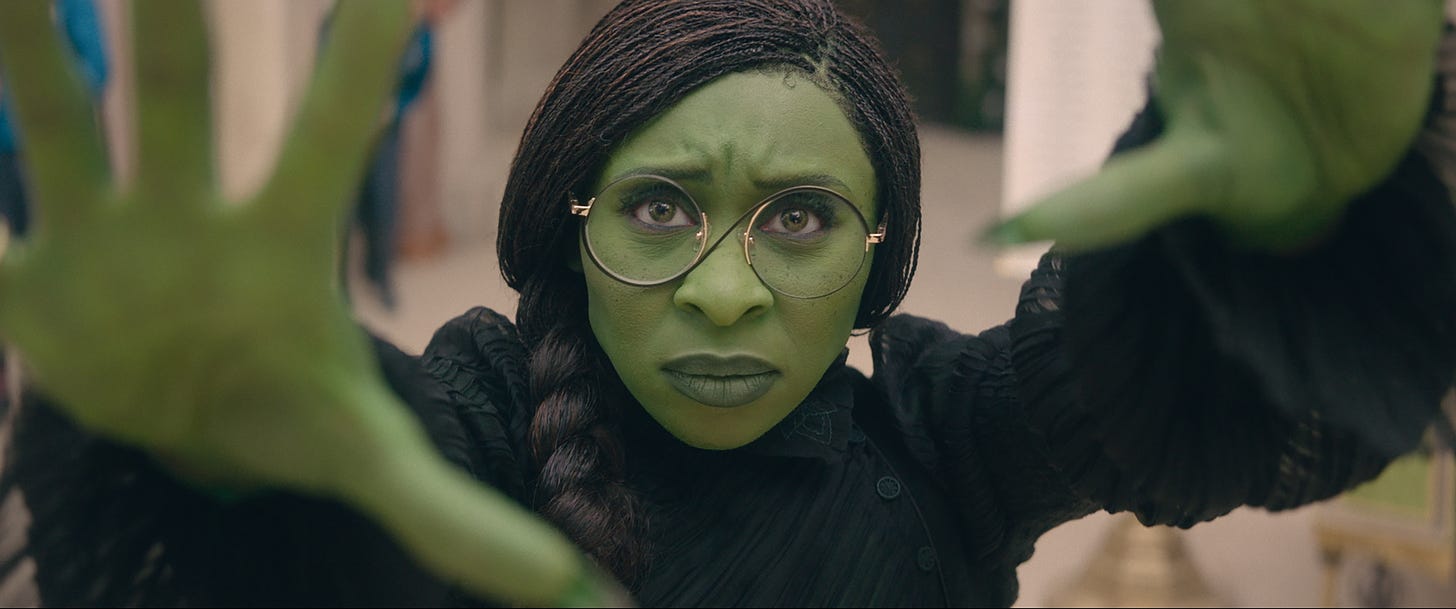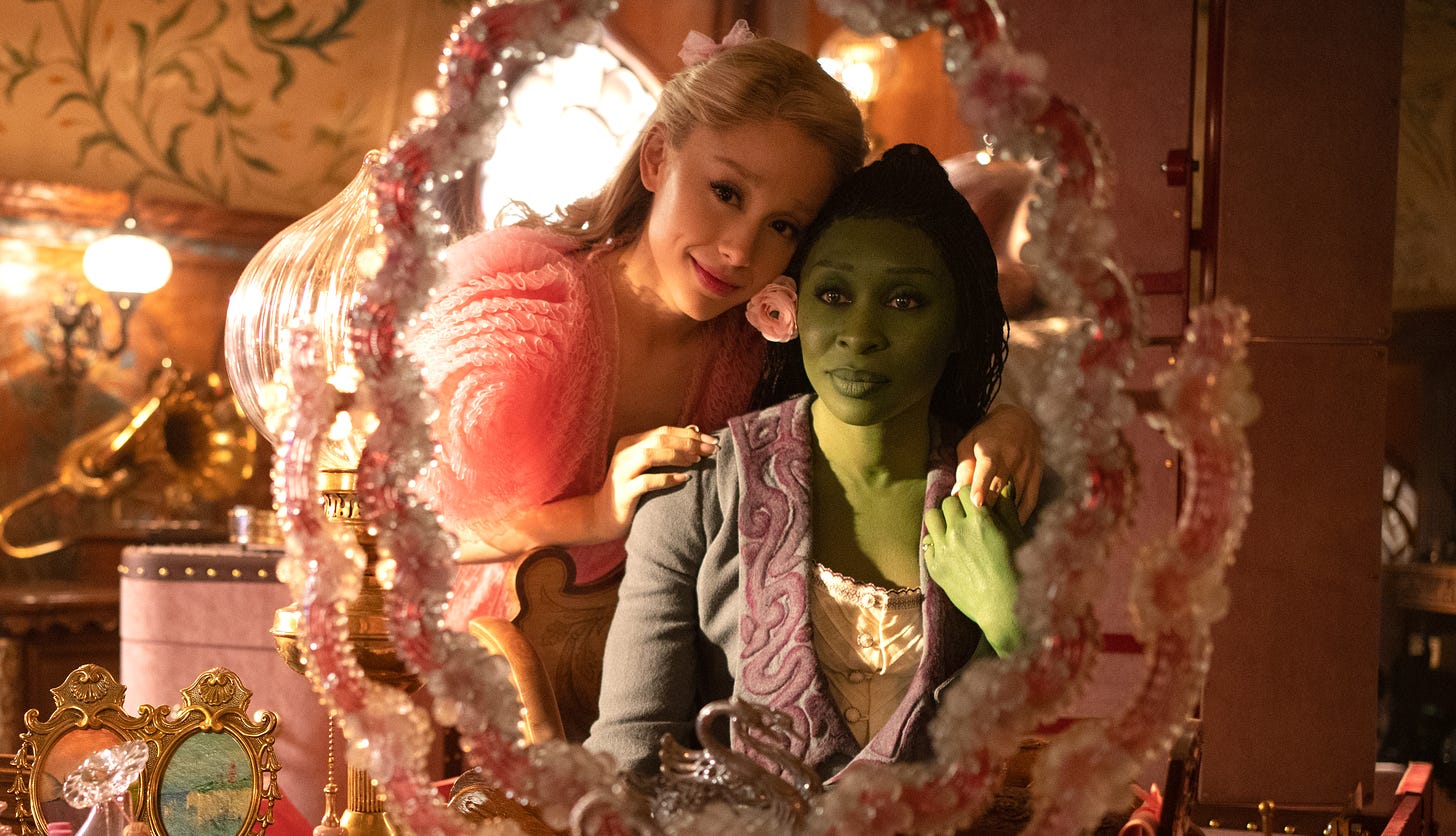'Wicked' is a little bit of a miracle
Cynthia Erivo and Ariana Grande are tremendous in a deeply faithful stage-to-screen adaptation
Welcome to Girl Culture, the newsletter where Caroline Siede examines pop culture, feminism, and more. You can learn about Girl Culture’s mission here and support here.
Wicked has long been one of my most highly anticipated films of the year, and yet, in the back of my mind, there was also part of me that never thought it could actually be good. I saw the musical again on Broadway last year and was reminded that Wicked really is one of those absolutely insane stage shows that barely hangs together as a coherent story yet is absolutely electric when it’s performed live. But, well, we all saw what happened when Dear Evan Hansen tried to recapture lightning-in-a-bottle stage magic in the far more literal medium of film. How could Crazy Rich Asians director Jon M. Chu possibly bring the stage show to the big screen in a way that’s anything other than confusifying and hideoteous?
Remarkably, he has. And while I don’t think Wicked is a perfect movie, I do think it’s a near-perfect execution of what Chu is specifically trying to do with this adaptation—which is to expand the story into a two-part saga while also delivering a deeply, deeply faithful rendition of the Broadway show. (It’s easily one of the most faithful stage-to-screen adaptations I’ve ever seen.) I’ve got some movie-specific problems with the color grading and a few of Chu’s staging choices. And I’ve still got those same questions about the tone and structure of the source material itself, which will likely become even more of an issue in Wicked Part Two next November. But Chu set out to do something I thought was impossible and achieved it on a level I truly didn’t expect. And that calls for some rejoicifying.
The biggest thing that makes Wicked so swankified (okay, I’ll stop now) is the clear love that everyone involved has for the Broadway source material, which rings out in everything from the Nathan Crowley’s gorgeous practical sets to Paul Tazewell’s glittering costume design. Wicked exists in a sort of half-steampunk-fairy-tale, half-Harry-Potter take on The Wizard of Oz, and while that could easily feel cheesy or hollow on screen, Chu creates an enchantingly cohesive fantasy world you immediately want to step into. Though the lighting is oddly murky and drab throughout—as if they didn’t have time to get it right before they started shooting—the tactical sets and cotton candy costuming just about make up for it.
So too do the musical numbers, which are inventively staged and exuberantly performed. As with In The Heights, Chu tends to prioritize fractured music-video-style images over the intimate emotional connection that the best movie musical directors can conjure. (Someone let Kenny Ortega direct another big screen musical ASAP, please.) But when it comes to big ensemble numbers like “What Is This Feeling?,” “Dancing Through Life,” and “One Short Day,” Chu’s more-is-more approach has an undeniable power.
This biggest key to the film’s success, however, is how much Chu zeroes in on the relationship between Ariana Grande’s Galinda Upland and Cynthia Erivo’s Elphaba Thropp—the earnest young college students who will eventually go on to become Glinda the Good and the Wicked Witch of the West in Dorothy’s journey through Oz. Whereas Chu’s In The Heights adaptation felt muddled in its attempts to figure out where to anchor its story, he knows just where the heart of Wicked lies. And working with Grande, Erivo, and screenwriters Dana Fox and Winnie Holzman (who wrote the script for the musical), he crafts a platonic love story that’s arguably even more powerful onscreen than it is onstage.
It would be impossible to oversell how tremendous Grande and Erivo are in their two central roles; powerhouses in both their vocals and their incredible chemistry with one another. While I’ve often seen Elphaba played surly and standoffish, Erivo zeroes in on the vulnerability lurking beneath Elphie’s unusually verdant exterior. Her Elphaba is less of a defiant loner than a shy, intelligent introvert cursed to live a life where she’s perpetually perceived. While the character is usually played as someone quick to anger, Erivo imagines her more as someone so burdened by an overwhelming sense of empathy that the world sometimes becomes too much for her to bear.
Still, while Elphaba gets the showier songs, I’ve always felt that Glinda is actually the far more compellingly written role in Wicked. And Grande is the movie’s biggest revelation, if only because I didn’t quite know she had this kind of performance in her in the way I suspected Erivo did. (If you’ve never seen Erivo’s performance of “I’m Here” from The Color Purple, fix that immediately.) Though Grande got her start as a teen performer on Broadway and Nickelodeon, she hasn’t really acted since. But she reemerges here with the confidence of someone finally doing what they were born to do.
Standing on the shoulders of Alicia Silverstone’s Cher Horowitz and Reese Witherspoon’s Elle Woods, Grande crafts her own delightfully manic take on the privileged but ultimately well-meaning “dumb blonde” archetype. (And she’s perfectly matched in that department by Jonathan Bailey’s smoldering, proudly vapid Winkie prince Fiyero.) But behind all the hilariously off-kilter line deliveries and bonkers physical comedy choices, she also layers in hints of emotional depth that I suspect will pay off beautifully next year, when Glinda’s arc really gets going in Part Two—a darkly political follow-up to the college social drama fun of Part One.
One of Chu’s greatest strengths as a filmmaker is capturing moments where people really see each other, and Wicked is full of those. Elphaba sees that her wheelchair-using sister Nessa (Marissa Bode) needs independence, not coddling. Glinda and Fiyero see each other as kindred spirits of social manipulation. Their goat teacher Doctor Dillamond (Peter Dinklage) sees how little his privileged students understand the dark prejudices slowly creeping into their society. Elphaba sees that Fiyero’s flippant nature is an act. And Glinda slowly but then powerfully sees Elphaba for who she truly is—launching a friendship that, to them at least, feels strong enough to change the world.
That Chu does all that while also creating a sweeping, earnest, old-fashioned bit of movie musical escapism is an impressive magic act. And though Wicked is technically just the first half of a story, it feels like a satisfying whole in the way you can enjoy The Lord of the Rings: The Fellowship of the Ring as a standalone adventure even as it ends on a cliffhanger tease for a greater epic. Whether or not Chu can salvage Wicked’s supremely messy second act remains to be seen. But I doubted him once, and I won’t make that mistake again. Maybe he really can defy gravity twice.
Grade: A-
Other stuff I’ve worked on lately: I went on Canadian radio to discuss the Eras Tour; reviewed the second season of Bad Sisters for The Boston Globe (a new byline for me!); started weekly reviews of St. Denis Medical for Episodic Medium; and wrote about Wonder Woman for my latest Women of Action column at The A.V. Club. Oh and I also created a Bluesky account, if you want to follow me over there.







